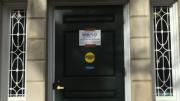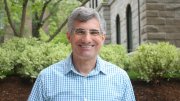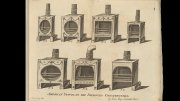Harvard’s graduate-student union election ended inconclusively last December. Although 1,456 students voted against unionization, and 1,272 voted in favor, more than 300 additional ballots—larger than the voting margin—remain under challenge. During the past month, officials from the University and the Harvard Graduate Student Union-United Auto Workers (HGSU-UAW) have appeared at the National Labor Relations Board’s (NLRB) Boston office to make their respective arguments about whether those ballots were cast by eligible voters; the NLRB is expected to make a decision the coming weeks. Harvard believes the challenged ballots shouldn’t be counted; the union argues that they should be—and hopes more broadly that the NLRB will void the election and call for a new one.
Harvard’s election took place November 16 and 17, after the NLRB last summer granted unionization rights to students at private universities engaged in paid teaching or research. Some ballots remain under challenge because Harvard and the union disagree over which jobs qualify as teaching or research. Jonah Susskind, a master’s candidate at the Graduate School of Design (GSD) whose ballot was challenged, testified before the NLRB in late February, arguing that his work as a teaching assistant (TA) for three courses should make him eligible to vote in the election.
According to a University statement, “Teaching assistants at the Graduate School of Design are master’s students who do not teach” because their roles provide only administrative, not instructional, support. The GSD website clarifies that TAs cannot assign grades, nor can they “serve as substitute instructors in the absence of the instructor of record.”
But Susskind argued in a recent interview that TAs’ roles are instructional, even if they don’t teach their own course sections, and that their official job description doesn’t account for everything they do: holding office hours for students, for example, or answering questions about assignments. “The role of the teaching assistants is profoundly instructional,” he said. “The work that comes out of the school would be impossible without them.” Gavin Ruedisueli, also a former GSD teaching assistant who testified at the NLRB, said that his role has required him to provide instructional as well as administrative support.
The union also argues that because Harvard didn’t include such students on the list of eligible voters that it provided the NLRB, it discouraged voting by some students who might still be determined eligible through the challenge process. Prior to last November’s election, for example, GSD executive dean Patricia Roberts wrote in an email sent to the school’s students that teaching assistants weren’t eligible to vote: “the position of ‘Teaching Assistant’ does not provide instructional services…For that reason, GSD students holding Teaching Assistant positions are not included on the list of eligible voters.” The email “made people feel confused and nervous about the whole thing, and people opted out [of voting] because they felt they were going to be ineligible,” Susskind argued. If the NLRB agrees that potentially eligible voters were dissuaded from voting, it could invalidate the election results and call for a new one.
Other students’ votes have been challenged over timing issues, or other matters not directly related to the nature of their work. Renugan Raidoo, a Ph.D. candidate in anthropology, said that he worked as a research assistant for a full semester last spring, but was only paid retroactively, in the final weeks of the semester, because he filled out his paperwork for the federal work-study program late. According to the election agreement signed last fall by Harvard and HGSU-UAW, students are eligible to vote if they worked “at least one semester”—that is, a full semester—in the academic year before the election. Raidoo provided evidence at the hearing that he had started work at the semester’s beginning.
Ben Green, a Ph.D. candidate in applied mathematics who was the head teaching fellow for an artificial intelligence course last year, has had his vote challenged because he is on a leave of absence this year, working for the City of Boston on issues related to his research. The election agreement specifies that only “enrolled” students are eligible to vote, which, the University argues, excludes those taking a leave. Green believes that isn’t a fair interpretation of his position: “If you were a member of the bargaining unit last academic year and will be again, you’re still eligible to vote in this election,” he said. “That perfectly sums up my situation.”
Green voted for unionizing because “it’s important for workers in any situation to have collective bargaining power…For grad students, it makes sense because they’re often not given a lot of protection or don’t have stipends or are overworked”; many other students interviewed expressed a version of the same, broadly pro-union position. Others cited specific conditions they’d like to improve through collective bargaining, like “the perennial issue” (as Raidoo called it) of lack of dental coverage in their compensation packages.
Both sides declared themselves confident after the hearings. “Throughout the hearing, the University worked to demonstrate the good faith effort we have made in this process to ensure all eligible students voted and those votes were counted. A majority of the votes counted were against unionization and we believe this hearing should confirm that outcome,” University spokesperson Ann Hall wrote in a statement. HGSU-UAW wrote, conversely: “Harvard left hundreds of students off the eligible voter list…We’re anticipating that the NLRB will hold Harvard accountable to a complete and accurate list.”








